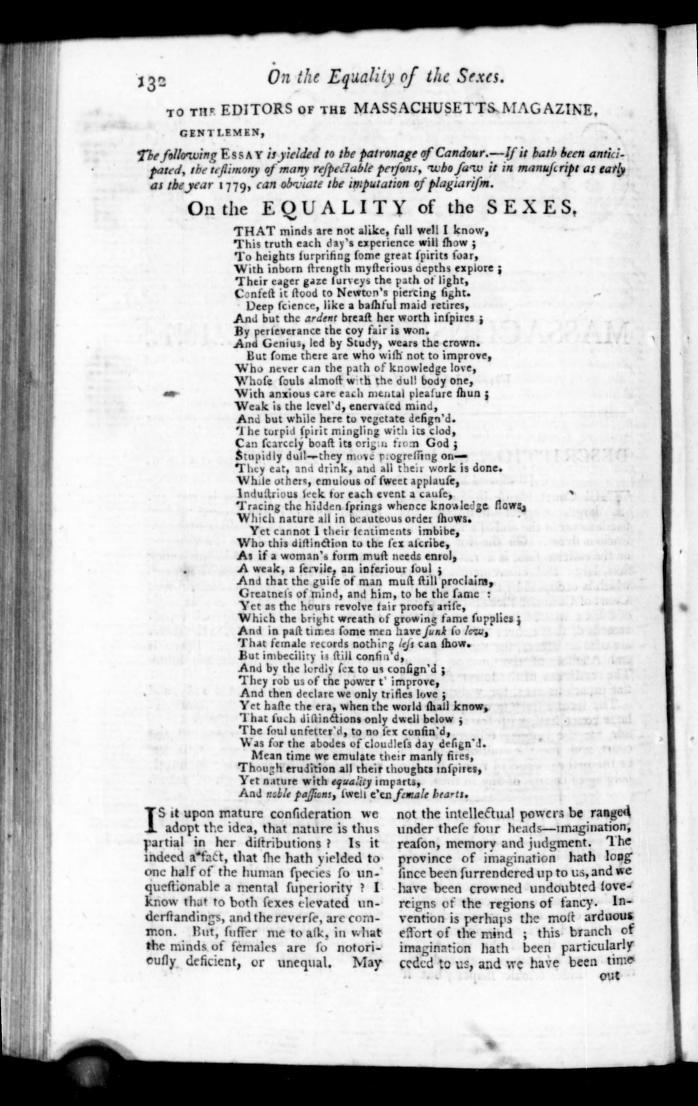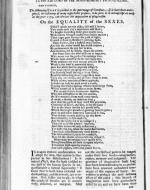Created by Alexis Brown on Sat, 05/04/2024 - 20:25
Description:
Shown above is an original copy of Judith Sargent Murray’s “On the Equality of the Sexes.” Originally published in 1790 in The Massachusetts Magazine, it advocated for gender equality. The essay challenges the notion of female inferiority, arguing that women's intellectual abilities are equal to men's and should be cultivated through education. Murray states, “But, suffer me to ask, in what the minds of females are so notoriously deficient, or unequal” The questioning of why women are being told they are “unequal” compared to men dictates the willingness that women have to speak up on the injustice and unfairness that they face. Questioning the societal norms that are placed upon women, allows for others to stand up and speak against those. Murray's work is a seminal piece in the early feminist movement in the United States, laying the groundwork for future discussions on women's rights and gender equality.
Madelon Chock in ”"An Inestimable Prize," Educating Women in the New Republic: The Writings of Judith Sargent Murray” states, “Murray supported and stood beside her counterpart in England, Mary Wollstonecraft, and ahead of generally accepted norms in proposing that women should be educated for their own well-being - in order to enhance their own lives , to earn their own livings , and to gain independence . 5 Murray believed that this goal would extend women's options and open intellectual and employment opportunities to” Murray's support for Mary Wollstonecraft and her advocacy for women's education were groundbreaking in their time. By aligning with Wollstonecraft, Murray demonstrated solidarity with an influential figure in the British feminist movement, helping to amplify their shared message across the Atlantic. Murray's proposition that women should receive education for their benefit, including the ability to earn a living and achieve independence, challenged the prevailing norms that confined women to domestic roles. This forward-thinking stance paved the way for broader acceptance of the idea that educating women was not just beneficial for society but essential for empowering women to pursue diverse opportunities in intellectual and professional realms.
Judith Sargent Murray shattered societal norms by advocating for women's education in 18th-century America. Her alliance with Mary Wollstonecraft and belief in women's right to pursue education, work, and independence challenged gender roles, laying the groundwork for future feminist movements.
Works Cited
Cheek, Madelon. “‘An Inestimable Prize,’ Educating Women in the New Republic: The Writings of Judith Sargent Murray.” Journal of Thought, vol. 20, no. 3, 1985, pp. 250–62. JSTOR, http://www.jstor.org/stable/42589169. Accessed 5 May 2024.
Murray, Judith Sargent. “Judith Sargent Murray’s *on the Equality of the Sexes* (1790).” The Public Domain Review, publicdomainreview.org/collection/equality-of-the-sexes/. Accessed 4 May 2024.
Murray, Judith Sargent. “On the Equality of the Sexes.” Nationalhumanitiescenter, nationalhumanitiescenter.org/pds/livingrev/equality/text5/sargent.pdf. Accessed 5 May 2024.


